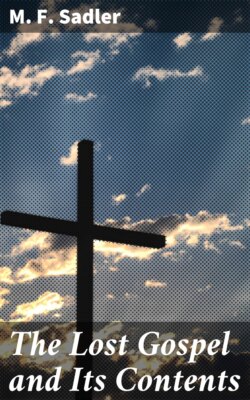Читать книгу The Lost Gospel and Its Contents - M. F. Sadler - Страница 14
На сайте Литреса книга снята с продажи.
THE PRINCIPAL WITNESS.—HIS TESTIMONY RESPECTING THE BAPTISM OF CHRIST.
ОглавлениеThe next extract from Justin which I shall give is one describing our Lord's Baptism. This account, like almost every other given in the dialogue with Trypho, is mentioned by him, not so much for its own sake, but because it gave him opportunity to show the fulfilment, or supposed fulfilment, of a prophecy—in this case the prophecy of Isaiah that the "Spirit of the Lord should rest upon Him."
"Even at His birth He was in possession of His power; and as He grew up like all other men, by using the fitting means, He assigned its own [requirements] to each development, and was sustained by all kinds of nourishment, and waited for thirty years, more or less, until John appeared before Him as the herald of His approach, and preceded Him in the way of baptism, as I have already shown. And then, when Jesus had gone to the river Jordan, where John was baptizing, and when He had stepped into the water, a fire was kindled in the Jordan; and when He came out of the water, the Holy Ghost lighted on Him like a dove [as] the Apostles of this very Christ of ours wrote. … For when John remained (literally sat) [29:1] by the Jordan, and preached the baptism of repentance, wearing only a leathern girdle and a vesture made of camel's hair, eating nothing but locusts and wild honey, men supposed him to be Christ; but he cried to them—'I am not the Christ, but the voice of one crying; for He that is stronger than I shall come, whose shoes I am not worthy to bear. … ' The Holy Ghost, and for man's sake, as I formerly stated, lighted on Him in the form of a dove, and there came at the same instant from the heavens a voice, which was uttered also by David when he spoke, personating Christ, what the Father would say to Him, 'Thou art my Son, this day have I begotten Thee;' [the Father] saying that His generation would take place for men, at the time when they would become acquainted with Him. 'Thou art my Son; this day have I begotten Thee.'" (Ch. lxxxviii.)
The author of "Supernatural Religion" lays very great stress upon this passage, as indicating throughout sources of information different from our Gospels. He makes the most of the fact that John is said to have "sat" by the Jordan, not apparently remembering that sitting was the normal posture for preaching and teaching (Matthew v. 1; Luke iv. 20). He, of course, dwells much upon the circumstance that a fire was kindled in the Jordan at the time of our Lord's baptism, which additional instance of the supernatural Justin may have derived either from tradition or from the Gospel to the Hebrews. Above all, he dwells upon the fact—and a remarkable fact it is—that Justin supposes that the words of the Father wore not "Thou art my beloved Son, in Thee I am well pleased," but "Thou art my Son, this day have I begotten Thee."
Now I do not for a moment desire to lessen the importance of the difficulty involved in a man, living in the age of Justin, giving the words, of the Father so differently to what they appear in our Gospels. But what is the import of the discrepancy? It is simply a theological difficulty, the same in all respects with that which is involved in the application of these very words to the Resurrection of Christ by St. Paul, in Acts xiii. 33. It is in no sense a difficulty having the smallest bearing on the supernatural; for it is equally as supernatural for the Father to have said, with a voice audible to mortal ears, "This day have I begotten Thee," as it is for Him to have said, "In Thee I am well pleased."
What, then, is the inference which the author of "Supernatural Religion" draws from these discrepancies? This—that Justin derived his information from the lost Gospel to the Hebrews.
"In the scanty fragments of the 'Gospel according to the Hebrews,' which have been preserved, we find both the incident of the fire kindled in Jordan, and the words of the heavenly voice, as quoted by Justin:—'And as He went out of the water, the heavens opened, and He saw the Holy Spirit of God in the form of a dove descend and enter into Him. And a voice was heard from heaven, saying, 'Thou art my beloved Son, in Thee I am well pleased;' and again, 'This day have I begotten Thee.' And immediately a great light shone in that place.' Epiphanius extracts this passage from the version in use among the Ebionites, but it is well known that there were many other varying forms of the same Gospel; and Hilgenfeld, with all probability, conjectures that the version known to Epiphanius was no longer in the same purity as that used by Justin, but represents the transition stage to the Canonical Gospels, adopting the words of the voice which they give without yet discarding the older form." ("Supernatural Religion," vol. i. p. 320.)
Here, then, are the remains of an older Gospel used by Justin, taken from copies which rationalists assert to have been, when used by him, in a state of greater purity than a subsequent recension, which subsequent recension was anterior to our present Gospels, and being older was purer, because nearer to the fountain-head of knowledge: but this older and purer form is characterized by a more pronounced supernatural element—to wit, the 'fire' in Jordan and the 'light'—so that, the older and purer the tradition, the more supernatural is its teaching.
